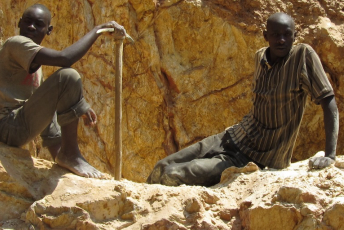On 20 February, Uganda celebrates a year since it officially launched East Africa’s first gold refinery. Inaugurated by Ugandan President Yoweri Museveni in the lakeside town of Entebbe last year, the US$15 million African Gold Refinery has since elicited a number of concerns.
A June 2017 report by environmental NGO Global Witness titled Uganda: Undermined, found that minerals from the Democratic Republic of Congo (DRC) and South Sudan pass through Uganda on their way to international markets. According to George Boden, Uganda campaign leader at Global Witness, the 18-month investigation exposed ‘endemic corruption and mismanagement in the country’s fledgling mining sector.’
‘The gold trade was worth $200 million to the Ugandan economy last year, but there are no official figures on where the gold came from, or where it is going,’ he told CNN shortly after the report was released.
The exploitation of the country’s gold, tin and phosphate riches has seen exponential growth in Uganda’s mineral industry in recent years; and with it, expectations of employment opportunities and economic development due to higher tax revenues. These revenues should be used to improve education, healthcare and infrastructure. However, the Global Witness report says that ‘crooked officials and international investors are profiting at the expense of Uganda’s people, environment and economy.’
The report further found that miners work under unregulated conditions, and that the mining threatened the Bwindi and Rwenzori national parks, home to almost half of the world’s remaining mountain gorillas.
A second report, submitted by the UN Group of Experts to the UN Security Council in August 2017, identified Uganda as major transit route for the illicit smuggling of gold from the DRC to the United Arab Emirates (UAE).
The UN Group of Experts traced the flow of gold exploited, taxed and trafficked by armed groups – particularly the FDLR (the Democratic Forces for the Liberation of Rwanda) and other militia groups operating in eastern DRC.
In June 2017, the Congolese Ministry of Mines estimated that 20 tonnes of gold from artisanal mining is smuggled out of the DRC every year. Uganda serves as a strategic transit hub linked with dealers operating in the UAE. The UN report says Dubai is the main destination of unwrought gold sourced from artisanal miners in the DRC. It says gold smugglers use loopholes in the UAE control system, where the ‘law does not consider smuggling activity to be a crime.’
The Uganda Bureau of Statistics’ data for 2016 confirms the findings of the two reports regarding the country’s limited local gold production. The Ugandan government also confirmed this to the UN Group of Experts in a June 2017 letter cited in the report.
However, online statistics from the Bank of Uganda show that the country’s official gold exports had increased from 11 kg in 2014, worth US$237 000; to 1 118 kg in 2015; and to 8 751 kg, worth US$340 million, the highest ever recorded, in 2016. This makes gold the second largest export after coffee. From January to April 2017, Uganda officially exported 2 938 kg, already surpassing the record for the whole of 2016.
In his 2017 report, the Auditor-General revealed inconsistencies between gold export permits issued by the country’s Directorate of Geological Surveys and Mines, which were only 16.281 kg compared to 8 691 kg valued at about US$340 million recorded by the Uganda Revenue Authority in the financial year 2016/17.
The figures above suggest that official gold exports from Uganda grew exponentially after the launch of the African Gold Refinery, owned by Belgian national Alain Goetz. According to official projections of the refinery, which had been in operation from 2014, it expected to export more than 10 tons of gold in 2017.
This suggests that either the gold exports from Uganda had always been largely underreported; or it originated from outside the country based on the knowledge that only small quantities are produced locally by artisanal miners, and on the findings of the UN report.
According to the UN report, Ugandan officials do not deny that gold is smuggled from the DRC to Uganda, attributing it mainly to the porosity of the borders. Moreover, it is known that only small quantities are produced locally by artisanal miners. This seems to confirm that smuggled gold and illicit exports might, at least in part, have contributed to the exponential growth of the country’s gold exports.
If it is true that criminal networks in Uganda act with impunity in an ongoing illicit trade in gold, they are likely to benefit from linkages to armed groups in conflict zones of eastern Congo and South Sudan. According to the UN report, the groups that are involved in the smuggling of gold in turn facilitate access to Congolese artisanal gold, and the flow into the international supply chain of this conflict gold, which is mined under appalling human rights conditions.
To curb this threat and contain the smuggling of gold across these countries, there is a need for deterrence by sanctioning individuals and corporate entities implicated in the illicit gold exports by the UN report. Deterrence would also be achieved by tightening controls and harmonising laws in the UAE, Uganda, Congolese and other countries that are likely to be involved. This would include working with international transport policy agencies to streamline the transportation of unwrought gold.
Deo Gumba, ENACT Regional organised crime observatory coordinator – East and Horn of Africa, ISS







